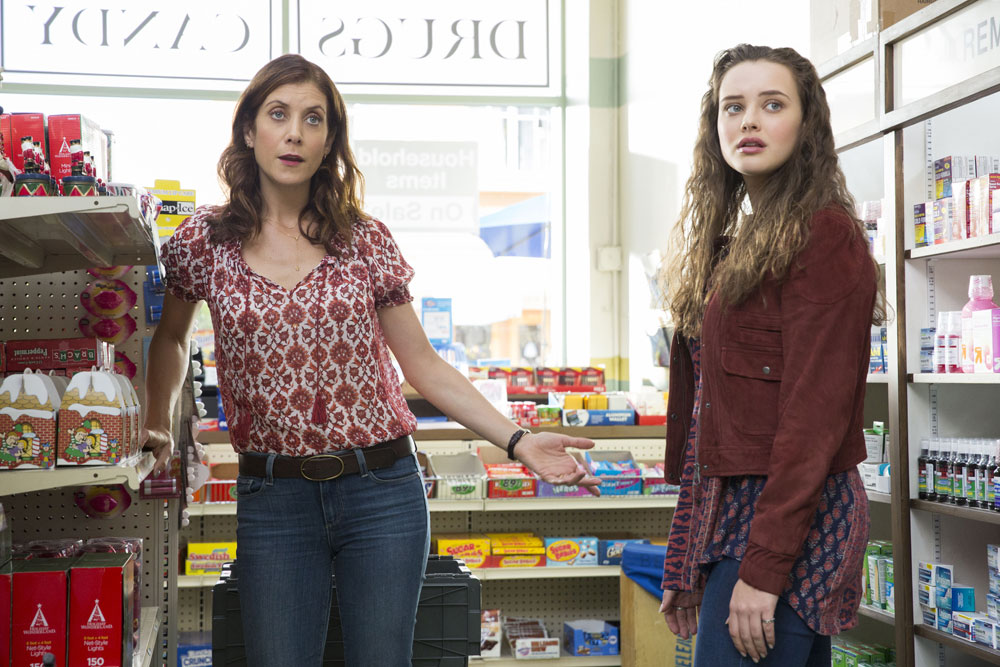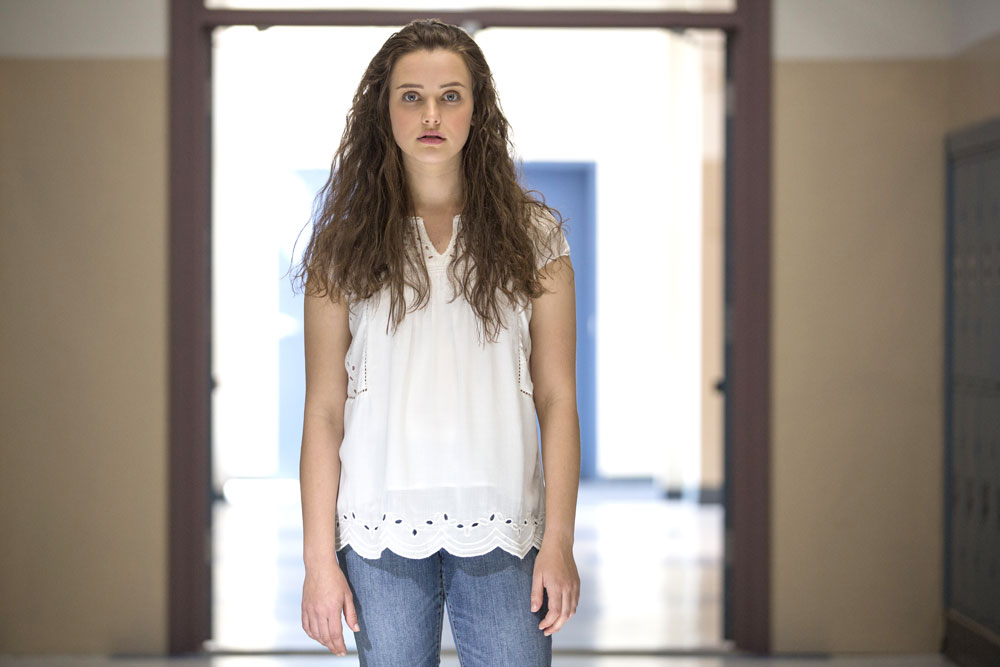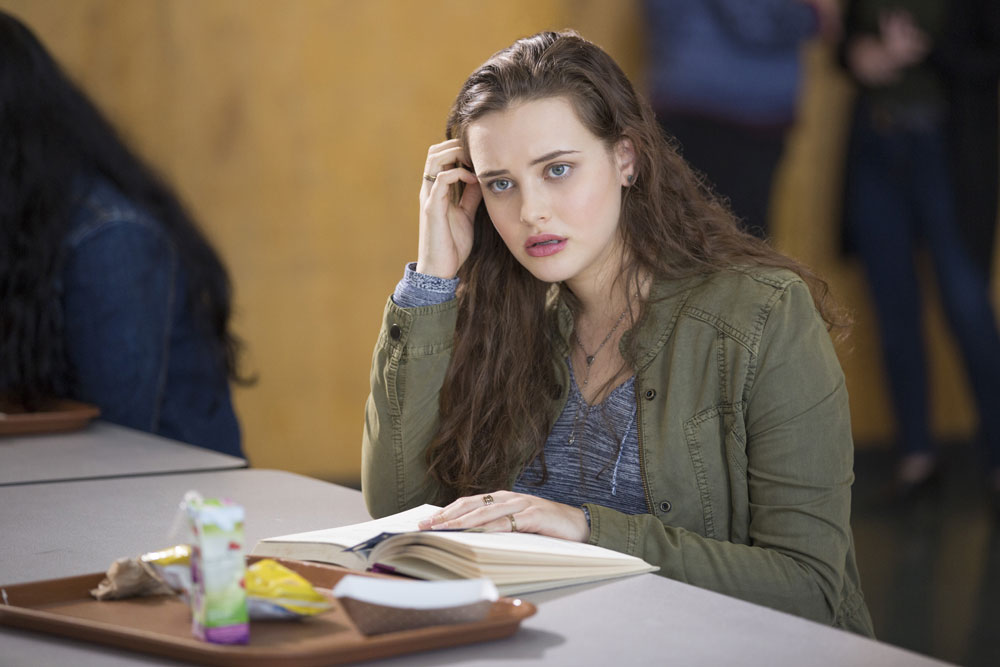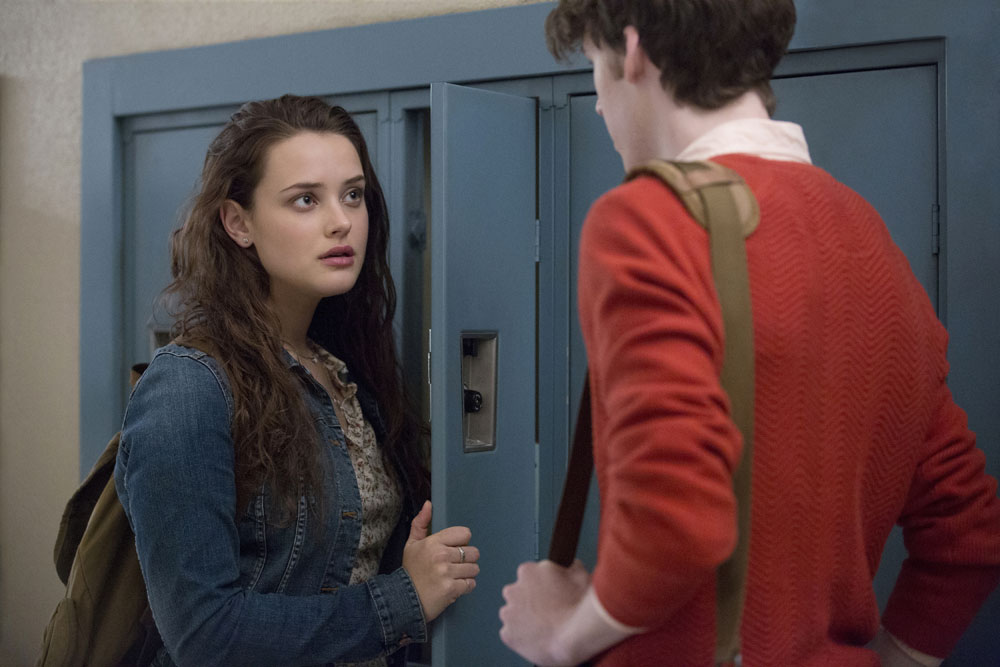
Spoilers for season one of 13 Reasons Why follow
When 13 Reasons Why debuted on Netflix two years ago, it was subject to intense criticism due to its treatment of suicide. The scene that provoked the most outcry, understandably, was the one in which main character, high school student Hannah Baker, dies by suicide. Hannah left 13 cassette tapes for explaining why she made the choice to end her life. (You can see some scenes from that here, trigger warning.)
Selena Gomez, an executive producer of the show, along with other cast and crew members, addressed the controversy. Netflix worked to proactively address the concern that the series might be glorifying suicide by including pre-episode warnings and by creating a website, 13ReasonsWhy.info, to provide resources. Netflix also created a half-hour special, Beyond the Reasons, which features interviews with the cast and crew and with mental health professionals who discuss the topics that inform the series. Following continued criticism, Netflix added more warnings to the beginnings of several episodes, including those that depict rape and Hannah’s death.
Though crew members (and 13 Reasons Why author Jay Asher) defended the inclusion of the scene depicting Hannah’s suicide in the final episode of the first season, Netflix has removed the scene. Engadget has more:
If you decide to rewatch the first season of 13 Reasons Why, don’t expect to see the controversial three-minute-long scene showing Hanna taking her own life in graphic detail. Netflix and the team behind the show have decided to tone down that part of the episode ahead of the third season’s debut and following advice from medical experts. In an announcement posted on Twitter, the team said they’re aware of the ongoing debate surrounding the show and have heard concerns about that scene in particular from Dr. Christine Moutier at the American Foundation for Suicide Prevention and other experts.
The show’s official Twitter account tweeted two statements, including one from show creator, Brian Yorkey, about the decision to remove the scene:
A statement from our show creator Brian Yorkey. pic.twitter.com/J6XiD9LVkU
— 13 Reasons Why (@13ReasonsWhy) July 16, 2019
Engadget also discusses studies that have been conducted to examine the show’s potential impact on people’s decisions to die by suicide. The National Institute of Mental Health found “a 28.9 percent increase in suicide rate among people ages 10 to 17 in April 2017, a month after the series began streaming.” This of course doesn’t prove causation. Numerous mental health organizations and advocates support Netflix’s decision. Some, including the American Foundation for Suicide Prevention, and American School Counselor Association, have issued a statement to The Hollywood Reporter.
“We support the decision to edit the scene in which Hannah takes her own life from 13 Reasons Why. There has been much debate about the series in the medical community. But this positive change will ensure that 13 Reasons Why continues to encourage open conversation about mental health and suicide prevention — while also mitigating the risk for the most vulnerable teenage viewers.”
I’m glad that Netflix removed the scene and is supporting viewers with mental health struggles, and people who have lost loved to suicide. I’m sure that viewers are divided about the choice. I understood why Netflix included the scene initially, but as the above mental health professionals point out, removing the scene is “a positive step.” As they note, the most important action we can take is having open and honest discussions concerning mental health and suicide prevention. We can support people with mental illnesses and fight the stigma.
If you are in the United States and are in crisis and in immediate need of assistance, text HOME to 741741 for confidential assistance 24/7 (http://www.crisistextline.org). You can also call the National Suicide Prevention Lifeline, 1-800-273-8255 (http://www.suicidepreventionlifeline.org).
In Canada, text HOME to 686868 (Crisis Text Line).
In the United Kingdom, call Samaritans, 116 123 (free)
(http://www.samaritans.org).
If you are in another country, please visit https://13reasonswhy.info/ to find contact information for national crisis groups.
photos credit: Beth Dubber/Netflix press














that whole shows is so irresponsible
I volunteer for the BC Crisis Centre, specializing in suicide prevention education for teens. We go to high schools and teach courses called “Reaching Out” and “Mental Health and Wellness”. When this movie came out, we all had additional training to deal with the potential classroom discussions, which turned out to be a lot.
I personally hated the show because it did glorify suicide in a way that connected with kids. The disclaimers and warnings would not deter kids from watching it, quite the opposite actually. I think it was irresponsible of Netflix to do this show. Period. I am glad they removed the actual suicide scene but the rest of the show made her suicide seem intriguing and acceptable way of dealing with teen issues.
Teen suicide is the second cause of death in Canada, accidents is number one. Kids need to talk about it, become educated and learn how to help their friends and family in potential crisis. This show did not address that in the right way and many kids were affected negatively by the show.
Our workshops teach coping skills, awareness, and blunt but honest facts on prevention and how suicide can destroy communities. That’s the discussion that needs to happen and the type of shows hat kids need to see, not this terrible program.
I worked at a children’s hospital in a major metropolitan area when this show came out. We had a large number of suicide attempts come in the months following the release. We started screening them to see if they had watched the show, almost all of them had. As someone who has experienced mental illness myself – I am a suicide attempt survivor and have lost loved ones to suicide – I agree that I found the show very irresponsible. It glorified suicide and that scene was incredibly graphic. Too little too late, in my opinion.
I do wonder though – is it causation or just correlation. That show was a HUGE hit. It was watched by SO many people. Teens tend to all jump on whatever television trend for the most part, so I don’t think it’s crazy to think that a huge portion of them have watched the show who just also happened to attempt suicide.
The other issue here is the timing of when the show came out. It was during the time of year that suicide rate tends to increase in general. April and May seem to be the start of the peak, and the show was released at the end of March. It picked up steam within those first few weeks.
Now, that said, I do think it was incredibly irresponsible for the show to have glorified it and depicted it the way that they did. I think there were probably many other ways that they could have tackled it without glorifying suicide.
Thank you for writing this. I have not watch and will not be watching this show so I can’t comment on the show itself. When I was told about it all I thought was how incredibly irresponsible it seemed. Going through a series of events that ultimately lead to a young person deciding to end her life as a solution to solving her perceived problems can only, in my opinion, encourage others struggling to do the same.
In 2016 I lost two family members to suicide. I watched them both struggle in the months leading up to this decision was a difficult time in our lives…but nothing compared to the life we all now live without them.
I’m not in any way a mental health professional, but I really hated the way the show framed Hannah’s suicide as a punishment for all of the people who treated her wrong. I thought it was really gross and dangerous.
They should pull the entire show. There’s actually been an increase in teen suicide since it debuted on Netflix.
I agree with the other comments here; the show was unnecessary and irresponsible. Honestly, the whole show should be pulled, but it’s too successful.
That said, I am apparently the queen of the non-sequitur today because I had the pleasure of randomly meeting Katherine Langford a year or so ago, and she is one of the most beautiful people I have ever laid eyes on. She was also so kind and humble. I had no idea who she was for a few minutes because she was just so normal.
Teens are so vulnerable and shows like this exploit that vulnerability. I wish the money Netflix makes off of this would be donated to programs to improve the mental health crises that many teens are facing. Trigger warnings and posting crises hotlines aren’t nearly enough when anxiety and depression are at epidemic levels.
Honestly the suicide scene was the only thing in the show that didn’t glorify suicide.
Otherwise it was a fantasy of Hannah letting everyone know how they hurt her and how sorry and destroyed they felt – that is the fantasy.
The suicide itself was hard to watch, as it should be.
I came to comment this exact thing. The suicide scene was so heartbreaking and graphic that it actually made me sick to my stomach. Whereas the rest of the show made it seem like “oh cool Hannah is finally getting her revenge!” The whole show needs to be pulled- full stop.
I completely agree with this.
There was a sense of unhealthy revenge as the episodes went on. Ironically Hannah became increasingly unlikeable in her blame game- the friend who looks after her at the party and hits the stop sign because she is looking for a charger for Hannah’s phone?
I felt so bad for her.
Ultimately despite the terrible things that happened to her, she wasn’t invisible and there were people who wanted to look out for her.
The show couldn’t decide if they were going with depression, or sense of being alone- and failed in both IMO.
Agree that the suicide scene was horrific and very sobering- it jarred because after the chidishness of the tapes, it brings the viewers back to the reality and ineluctability of suicide.
I think it’s very interesting that in the books, she apparently fails in her attempt? It would make more sense as a narrative- the tapes scenario is presented as if she wants to see the impact of her (almost) death on her friends.
She didn’t fail in the book. The author says that how he originally wrote it, but the publisher or editor convinced him to change it to she succeeded. It was a different method though, if I recall correctly she overdosed on pills. I actually think the show took pains to make it much more horrible than in the book, probably as a deterrent.
I feel the same. If you had been entertaining any romanticized fantasies about hurting yourself to make your bullies take notice, the actual scene of Hannah committing suicide is a bucket of cold water all over that. It’s disturbing and awful – as it should be. Most viewers were probably actively yelling/saying No No Don’t Do It! at their screens (I know I was.) I can’t help but wonder if all these people calling the show irresponsible and saying teens shouldn’t watch it also believe that teaching abstinence and refusing to talk about sex is a good idea too. We all know how well that works. I mean if we really want to help kids come to terms with the problems they face, we should just pretend suicide isn’t a thing. Maybe they won’t see it if it doesn’t move.
People don’t actually kill themselves because of a tv show, my god. Depression doesn’t work that way. Just like you won’t become anorexic or bulimic if you watch a tv show about anorexia or bulimia.
Also, I find it super hypocritical that scenes of people shooting and killing each other are literally EVERYWHERE, all the time. Violence is glorified and normalized to the extreme on tv. And no one bats an eye.
I teach high school, all my students talked and talked about this show. I also have a daughter who, about the same time this came out, struggled with depression and suicidal thoughts. This show was TERRIBLE. Terrible especially that they marketed it towards teens. Highly dramatic shows that target teens, like this, DO glorify and romanticize awful tragedies like all consuming revenge, suicide, and even eating disorders. Teens aren’t grown, and there’s a lot of scientific research about teenage brains and impulsivity. Violence and gore SHOULD be toned down, or at least limited, I completely agree with you about that. But, as a parent and teacher of that same age group, unfortunately a how to video on a show based on teens and high school is too much. It struck an unrivaled fear in me. Thankfully my daughter (17) had the maturity to stop watching because it was so triggering, but someone younger or more alone at home may not. And that scene could be taken as inspiration.
It’s a trigger because it shows vulnerable teens the reality and means to do it.
Have you heard of the website sanctioned suicide?
They have a glossary of means and methods of how to die, with detailed instructions.
That practical side can be a trigger.
Here is what I would like to know. I have never watched this show, but it appears it’s a US-based show. How many people who watched, or have teens who watched, are gun owners? I would wager, quite a few. How many would consider getting rid of those guns, if they had a depressed suicidal teen in their home? I would wager, almost none. America’s horrifying gun obsession needs to be addressed in this conversation as well.
There’s a movement in my state right now to allow people who are suicidal to sign up for a voluntary registry that will prevent them from being allowed to buy guns, and there’s even a great deal of pushback against THAT! It’s being spearheaded by the daughter of a woman who shot herself in the park across the street from my work, which I sadly caught the aftermath of when I was leaving and am still haunted by. This country makes me so angry in so many ways.
I felt it glorified suicide as well. I think the underlining tone if the show was something along the lines of -nobody understands me, they’ll all be sorry after I die, serves them right. Which are typical teenager thoughts.
I was really disappointed in how hopeless and gloomy it was.
Very problematic series.
And it top of that, it just wasn’t very GOOD! They couldn’t have written it into something that had some kind of point, but it didn’t. The whole thing was gratuitous.
When this show came out, I was working at a mental health organization for children and teens (in marketing/PR, not as a clinician). I was contacted by our local press for comment about the show and our program’s clinical director echoed the concerns stated above. She clarified that there can be a “contagion” effect with suicide. She explained that when there is a suicide at a school, for example, the chances of another is really, really high. It’s not that the show “glorifies” suicide so much as that it promotes this “revenge fantasy” that teenagers who are already at risk will relate to. She screened all teens in our program presenting with suicidal ideation to see if they had watched the show (they all had); she sent out alerts to parents; and said she would not let her own teenage children (who had no mental health issues) watch it.
That show is a repulsive exploitation of a horrific tragedy, and I refuse to even touch it. If they bothered to research suicide at all, they would’ve known the show itself was a glorification of the material and dangerously impressive to struggling reviewers and completely irresponsible to put to camera.
Also, I am BEYOND tired of shows treating female death and suffering as something to be consumed as a form of entertainment. F*ck off with that nonsense.
I think the suicide scene was terrifying and awful and would actually be a deterrent. As someone who has suffered from major depression most of my life it certainly devastated me to watch it. People who contemplate suicide and are serious about it are going to do it. It’s not about revenge or all this nonsense, they just want to end the horrible pain they are in.
Yes, that is exactly my point. But most people have no idea what proper clinical depression is. No tv show or the lack thereof is going to cure or save a mentally sick person. It just shows people treat mental issues too lightly.
Instead of cutting scenes from netflix how about we pay attention to the actual people around us more than we do to the tv set.
A tv show is not gonna mean much to someone who seriously considers taking their own life. But talking to them might.
There’s something off about the whole show. Pulling the scene doesn’t help, it actually makes it worse. The suicide scene is triggering to people who have lost loved ones to suicide, but the rest of the show may be triggering to the suicidal, which is the group we are most worried about this show worsening symptoms for.
It’s no different than that episode of Pokemon that gave some children seizures in Japan when it first aired. Just remove it from Netflix altogether. It exacerbates existing symptoms in children and young adults who are sick or may become sick, and that’s irresponsible. Even if it’s not dangerous for everyone, it’s dangerous for enough children and young adults that it needs to be removed from streaming platforms.
I’m shocked at how many people are saying the show doesn’t affect that. Suicidal ideation, and those of us who struggle with it, even on good days, is often triggered by other suicides. I made a point to not watch this show for that reason.